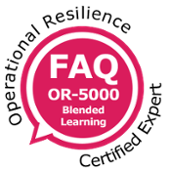Building Operational Resilience by Focusing to Improve and Communicate Lessons Learned
Operational resilience (OR) is not merely a regulatory requirement but a strategic approach that can add significant value to an organisation.
In our previous four stages, we explored the foundations of operational resilience. This is the fifth critical stage of the "implement" phase within the OR planning methodology.
This blog explores deeper and focuses on improving and communicating lessons learned from “peacetime” scenario testing or actual operational disruptions.
Establish
| Strong Leadership |
Successful OR begins with dedicated leadership. Ensure that the right people are driving the initiative from the top. |
Define
| Clearly Defined Objectives |
Articulate the objectives and scope of your operational resilience program. Be clear on what your organisation aim to achieve and how to measure success. |
| Identify Key Components | Identify vulnerabilities and dependencies in your organisation’s processes, technology, and data flows. |
| Risk Assessment | Conduct thorough risk assessments to understand potential threats and their impact on your operations. |
Design
| Integrated Approach | Create a holistic OR framework encompassing your business continuity and crisis management initiatives. |
| Communication Channels |
Develop effective communication channels for both internal and external stakeholders. Understand that proactive communication is critical during disruptions. |
| Internal and External Stakeholders | Tailor your communication approach to meet the needs of different stakeholders, including employees, partners, regulators, and customers. |
| Crisis Management | Leverage crisis management (CM) and Business Continuity Management (BCM) protocols and stakeholders to enhance OR. |
Implement
| Sponsorship | Ensure strong sponsorship from top management to convey the significance of OR within your organisation. |
| Dedicated Function | Establish a dedicated OR function with direct reporting to senior leadership. |
| Subject Matter Expertise | Seek expertise and knowledge from various areas within your organisation, such as data analysis, technology, and risk management. |
| Data Integration | Implement a robust data gathering and analysis process to understand the potential domino effects of failures. |
Sustain
| Self-Assessment | Continually assess your OR program’s performance, incorporating lessons learned from real-world scenarios and exercises. |
| Strong Governance | Maintain governance structures that support your OR program and ensure clear roles and responsibilities. |
| Communication and Change Management | Emphasise transparent communication and change management practices to foster a culture of resilience. |
| Data Analysis and Integration | Keep refining your data analysis and integration capabilities to adapt to changing risks and dependencies. |
| Industry Collaboration | Collaborate with peers and competitors to stay informed about emerging threats and best practices. |
Self-Assessment and Communication
One crucial aspect of building operational resilience is self-assessment.
| Self-Assessment | Regularly evaluate your program’s effectiveness and use success factors as a yardstick. |
|
Measure your commitment to OR beyond regulatory compliance. |
|
|
Is it driven by the belief that OR can bring value to your organisation? |
Communication is another cornerstone of operational resilience.
| Communication | Built effective communication channels and practices to help you convey the “why” and “how” of your OR program to stakeholders. |
| Building trust by sharing information transparently and managing expectations is essential. |
Summing Up …
Operational resilience is not just about meeting regulatory requirements; it is a strategic imperative that can enhance your organisation’s ability to withstand disruptions.
By following the five stages of the OR planning methodology and incorporating success factors, you can build a resilient organisation that thrives in an ever-changing landscape.
Remember, it is not just about ticking the compliance box; it is about embracing a culture of resilience that adds value and secures the organisation’s future.
More Information About Operational Resilience OR-5000 [BL-OR-5] or OR-300 [BL-OR-3] Course
To learn more about the course and schedule, click the buttons below for the OR-3 Blended Learning OR-300 Operational Resilience Implementer course and the OR-5 Blended Learning OR-5000 Operational Resilience Expert Implementer course.
 |
 |
 |
 |
 |
![[BL-OR] [3-4-5] View Schedule](https://blog.bcm-institute.org/hs-fs/hubfs/hub_generated/resized/e4287b59-1a43-4e10-8e43-c73b27b3ca39.png?width=172&height=50&name=e4287b59-1a43-4e10-8e43-c73b27b3ca39.png) |
![[BL-OR] [3] FAQ OR-300](https://blog.bcm-institute.org/hs-fs/hubfs/hub_generated/resized/294e989f-8613-4bf3-96a5-a89408cfb9ca.png?width=150&height=150&name=294e989f-8613-4bf3-96a5-a89408cfb9ca.png) |
 |
|
 |
 |








![Email to Sales Team [BCM Institute]](https://blog.bcm-institute.org/hs-fs/hubfs/hub_generated/resized/850988ce-aa7d-4953-95cf-797635341edd.png?width=100&height=100&name=850988ce-aa7d-4953-95cf-797635341edd.png)


